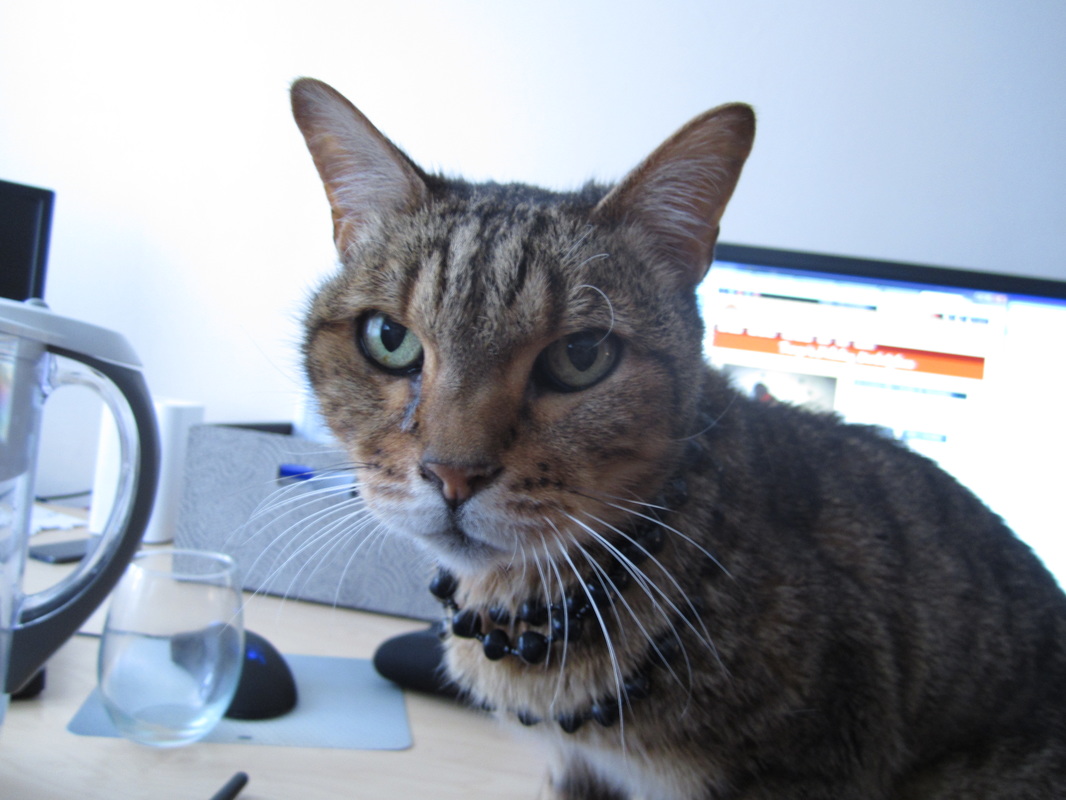|
There's no doubt that BeadforLife has been a great experience. I got to go to Uganda. I raised thousands of dollars to support the wonderful women whose voices and experiences became real during my time there. I bought and sold beautiful, handmade, fair trade pieces. I took a picture of my cat wearing a BeadforLife necklace. The YP program was conceived as a program to reach out to young professionals. From the program announcement: "We want motivated, compassionate, movers, shakers, and difference-makers! In one word, we want LEADERS who want to use their time and talents for good! We need YPs who aren't scared to roll up their sleeves and get to work building a successful program. As a YP, you will contribute to the growth process of the program, participate in Think-Outside-The-Box fundraising to support BeadforLife programs, and participate in the Live Below the Line Challenge."
Now, I did all of that. I lead the Virtual Coffee Hours, which were meant to bring YPs together to converse about the topics that mattered to them. I became a member of the YP advisory board. I raised money, reached out to all of you and got a terrific response. To me, the program ending doesn't invalidate BeadforLife or the money you all contributed. Or, for that matter, the work we did to grow the program. So, why, if I had a successful experience in the program, is it ending? The answer is a story about the tricky pathway to volunteer engagement, financial fiscal years, and program design. There are two ways to look at it: you could blame everyone, or no one. I think both are valid. Although YPs had the option to continue in a different volunteer program, I thought it was a good opportunity for me to reassess my chosen commitments. I wish it had ended differently, but I want to say thank you to everyone who supported me and the program.
0 Comments
 A generic photograph that my dad wanted me to use on his small business website. Too bad, Dad! A generic photograph that my dad wanted me to use on his small business website. Too bad, Dad! No one likes tax time. At best, it's yet another reminder of the grown-up world. At worst, it's the devil coming to take even more of your money than you already gave him during the year. I, however, have a bittersweet relationship with taxes. My childhood had four seasons: summer, fall, winter, and tax season; my father is a licensed tax preparer. He built this small business while working full-time as a firefighter. It's true that a fire station has a lot of downtime, especially for the person manning the ladder truck, which typically responds to fewer calls than the standard engines or ambulances. Many firefighters do, and thrive on the long shift schedule, which is followed by several days off during which they can grow their other business. Their contacts and reputation as blue-collar heroes help. But that doesn't make it pleasant. The increased income helped our family relax, pay for big ticket purchases, and make ends meet after the spendy holiday season. However, it also meant high tempers, overwork, stress, and reduced family time. My father worked (and continues to work!) so hard during tax season that he set a standard that seemed nigh unreachable. Many of us have had a ten or twelve-hour video gaming session at least once, or a binge-watch of a show that keeps us at our computer. My dad regularly worked ten or twelve hour days at his desk. We used to joke that the only thing that could get him out of his seat--besides dinner, which my mother insisted we eat as a family--was a fire! Nowadays tax season is heralded by some wordsmithing of my father's business to client communications, fielding computer upgrade questions, and stealing all the new promotional pens for my personal use. I don't feel a January dread the way I used to, but I still understand that travel in either direction and quality time get eaten up by a business that could kick any standard, big-box tax firm's ass in turnaround time, quality, and price. However, as I went to tally up my itemized deductions this year, I realized just how much time and money I had spent last year on charitable giving, volunteer work, and donations. I donated to eleven nonprofits, volunteered my time for four others, and assisted other crowdfunding and Patreon efforts that aren't tax-deductible. I also bought products from the nonprofit organizations I support, and used Amazon Smile to give to a nonprofit of my choice. What I learned: if you keep giving and doing what you can throughout the year, you'll have something to feel good about when tax season comes. Reflecting on my contributions gave me a sense of purpose and direction for the yet-unused time and money in the year to come. Even if you don't acknowledge tax season as a real season. *** Seriously, my dad is awesome and he works with clients in any state. I am also available to hire as a freelance writer and simple web designer. |
Archives
June 2020
Topics
All
|


 RSS Feed
RSS Feed